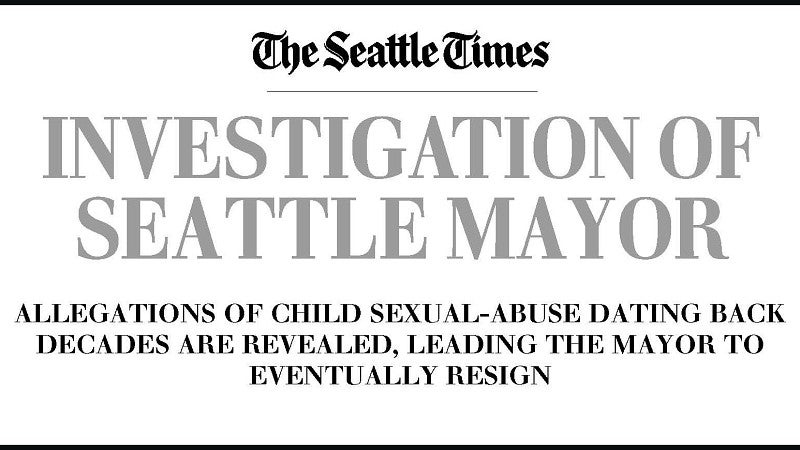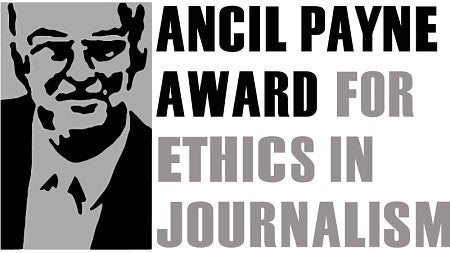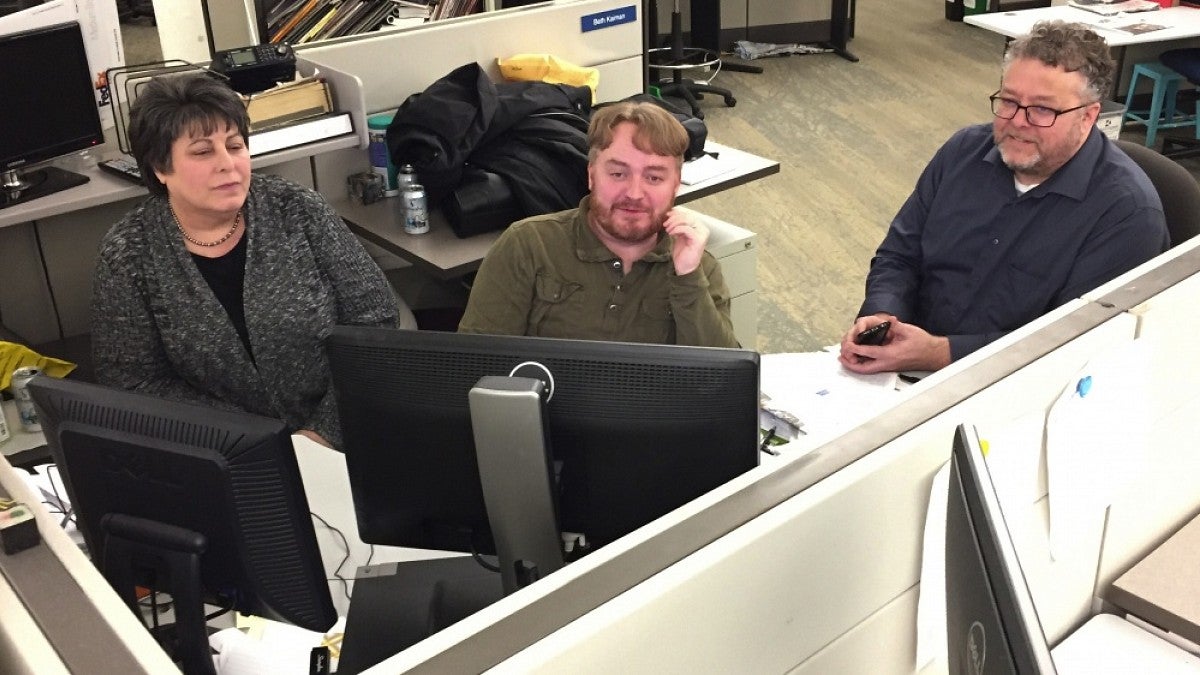When Seattle Times journalists Jim Brunner and Lewis Kamb learned a sexual assault lawsuit was in the works against “the executive of a large municipality,” they knew it was worth investigating. But they had no idea the story would end up shaking the city and challenging their careers.
After some digging, the reporters discovered that a young man had accused then-Seattle Mayor Ed Murray, the city’s first openly gay mayor, of sexually assaulting him when the man was a teenager.
The decisions the reporters made next earned them the Ancil Payne Award for Ethics in Journalism. The award, sponsored by the School of Journalism and Communication and the Payne family since 1999, honors the difficult ethical choices journalists make behind the scenes — critical decisions that are often invisible to the average reader.
“Some have called the ethics of media professionals into question. But the truth is that journalists have one of the strictest codes of ethics in the world,” said Juan-Carlos Molleda, Edwin L. Artzt Dean and professor of the School of Journalism and Communication. “Ancil Payne, a Seattle broadcasting legend, established this award at the SOJC to recognize the tough calls journalists must make every day, even when it means putting their livelihoods or their lives at risk.”

“Any way you look at it, this story was tragic for its subjects and our city,” Brunner said. “I am close to people who have been victims of sexual abuse and know the trauma it inflicts. Yet I constantly worried that false allegations or sloppy reporting could unjustly destroy a man’s life.”
The second dilemma the journalists faced was whether to include the stories of two other men who had approached The Seattle Times in 2008 with similar accusations against Murray. At the time, the newspaper did not publish those stories because they could not be verified. Brunner and Kamb tracked down the previous accusers and convinced them to go on the record.
“Journalists are weighing ethical decisions story by story, every day in the newsroom,” Kamb said. “Readers probably don’t realize it, but even what seems like a short and uncomplicated story can require deep ethical considerations.”
Once The Seattle Times broke the story, Brunner and Kamb received angry emails and phone calls defending Murray, and some politicians urged their social media followers to unsubscribe from the Times. Despite the pressure to back off, the journalists made another decision: to publish follow-up articles when two more men came forward with accusations.
“(Reporters) have always sought to abide by journalism’s core tenet,” Brunner said. “What has shifted over the years is the news environment in which we operate, with stories moving at lightning speed through social media, competing with conspiracy theorists and politically motivated disinformation.”
Brunner and Kamb will be on the UO campus April 18 to participate in an ethics panel and attend the Ancil Payne Award for Ethics in Journalism award ceremony. The panel takes place 3-4 p.m. in the Erb Memorial Union’s Redwood Ballroom, followed by the ceremony and catered reception 4-5 p.m. Both events are open to the public.

Finalists Wa Lone and Kyaw Soe Oo, correspondents for Reuters, are facing a 14-year sentence for their coverage of the massacre of Rohingya Muslim refugees by Myanmar soldiers. According to Reuters, the journalists are in prison awaiting a hearing on March 14.
“Journalists should not be jailed for telling the truth, and those willing to take the risk to tell important stories are heroic,” said Ancil Payne Award judge Kathy Best, editor of The Missoulian and The Ravali Republic.
Associated Press reporter Kristen Gelineau and photographer Maye-E Wong also were recognized for ethically telling the stories of 21 Rohingya women and girls who witnessed the slaughter of their loved ones before they were violently raped by Myanmar soldiers.
“(Gelineau and Wong) struggled against an intense desire to physically help each of the women, who lived in absolute squalor, were often sick and starving and desperately needed food and clean water,” wrote AP editor Mary Rajkumar in a nomination letter. “Gelineau knew that giving them money would violate the AP’s journalistic principles, yet she often felt sick in her stomach at their circumstances. She had to remind herself after each interview that the best way to help these women was to tell their story.”
The third finalist reported on human rights violations in Yemen during the country’s ongoing civil war. The AP’s Maggie Michael documented the United Arab Emirates’ detention and torture of prisoners of war in secret prisons, a story that led to inquiries into the involvement of U.S. military interrogators.
“This year’s winner and finalists were selected from a very strong pool of nominees,” said Tim Gleason, director of the Ancil Payne Award. “Journalists across the country, from the largest news organizations to the smallest blog, work hard to discover and publish accurate, truthful information. When there is much shouting about ‘fake news,’ it is ever more important to honor journalists who courageously seek the truth and make careful ethical decisions.”
The Payne Award Selection Committee also follows its own code of ethics. In accordance with the Payne Award Conflict of Interest policy, judges must recuse themselves from deliberations when they have a conflict of interest. Three of the judges this year declared a conflict of interest concerning The Seattle Times and did not participate in discussion of The Seattle Times nominations or determination of this year’s winner.
Brunner and Kamb’s reporting and decision-making still rose to the top.
“When you’re reporting stories that can change people’s lives, the bar should be set very high,” Kamb said. “My main takeaway from my experience on the Murray stories is that doing the ethical thing is often hard. These were not easy stories to write, and we never took them lightly.”
—By Becky Hoag and Andra Brichacek, School of Journalism and Communication


